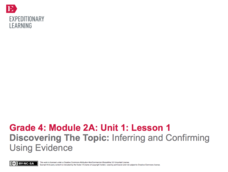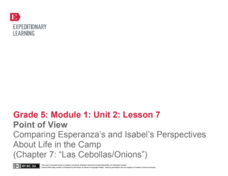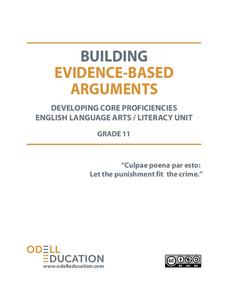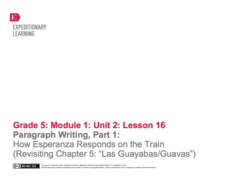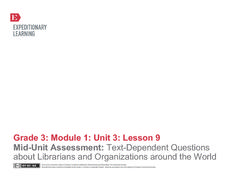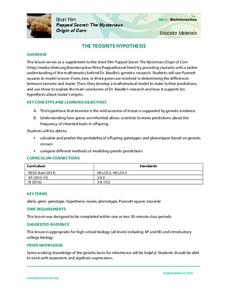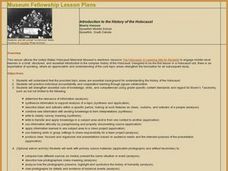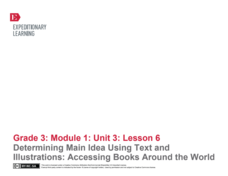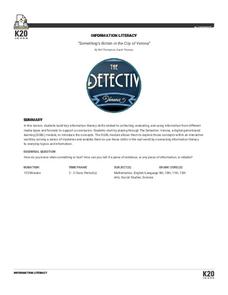Curated OER
Reformers versus Residents in Five Points: A Role Play
Social Studies and role-playing can go hand in hand. Learners use supporting evidence found in primary and secondary source material to develop a character from the Five Points neighborhood in the 1850s. Each student takes on the role of...
NASA
Introduction: Building Claims from Evidence
Making a claim without supporting it has little value. Learners work on their claim-making skills in a well-designed lesson. They view still images from a video and make claims using support from the visual representations. They then...
Curated OER
It's Your Opinion
Everyone has a different opinion about the characters they read about in books. Have your class explore forming an opinion and finding evidence to support it as they read and discuss what they think about a particular character. They...
Odell Education
Building Evidence-Based Arguments: “Doping can be that last 2 percent.”
Even the most thrilling sports career can end in an asterisk if the player uses performance-enhancing drugs. Focused on the topic of doping in sports, a seventh grade unit breaks down the arguments for and against steroids in five...
EngageNY
Discovering the Topic: Inferring and Confirming Using Evidence
Allow your class to figure out what they will be studying through an inquiry-based anticipatory set that involves analysis of mystery documents and practice with making inferences. The lesson plan document includes a detailed description...
EngageNY
Point of View: Comparing Esperanza's and Isabel's Perspectives About Life in the Camp (Chapter 7: "Las Cebollas/Onions")
Explore point of view and more with a Common Core-designed instructional activity. Learners experience different points of view by representing one of two characters from Esperanza Rising during a partner discussion. They must use...
Odell Education
Building Evidence-Based Arguments: "Cuplae poena par esto: Let the punishment fit the crime."
Should a criminal's punishment match the crime? An argumentative writing plan explores this question as class members investigate a variety of mixed-medium sources by experts in the field, form evidence-based claims, and support them...
EngageNY
Continued Close Reading of Nasreen's Secret School: Discussions of Questions and Evidence
Third graders answer text-dependent questions of the story Nasreen's Secret School both independently and then collaboratively through using the carousel of questions strategy. This plan is the seventh instructional activity in a...
C3 Teachers
African American Voices and Reconstruction: What Does It Take To Secure Equality?
High schoolers research the 13th, 14th, and 15th Amendments, as well as other primary source documents, to determine Reconstruction's impact on the North and South. The 34-page inquiry-based lesson includes a staging question and...
C3 Teachers
Women’s Rights: What Does It Mean to Be Equal?
A guided-inquiry lesson asks seventh graders to research the compelling question, "What does it mean to be equal?" Guided by three supporting questions, researchers complete three formative performance tasks and gather evidence from...
C3 Teachers
2020 Protests: Is There Anything New about the 2020 Protests?
Are marches and protests an effective form of resistance? That is the question high schoolers seek to answer in this inquiry lesson as they compare the 2020 protests to historical ones. Researchers use Venn Diagrams to compare images...
C3 Teachers
Black Women Writers: What Gets Black Women Heard?
Zora Neal Hurston, Toni Morrison, and Maya Angelou are featured in a guided inquiry unit. High schoolers research the lives and works of these and other Black women writers and craft an argument, using evidence from their research, to...
EngageNY
Paragraph Writing, Part 1: How Esperanza Responds on the Train (Revisiting Chapter 5: "Las Guayabas/Guavas")
When your class members have completed the novel Esperanza Rising, they will be ready to write an expository essay on how Esperanza responds to events and what this says about her character. Set your pupils up for success by...
ReadWriteThink
Persuasive Essay: Environmental Issues
Young environmentalists learn how to craft a persuasive essay about an environmental issue they consider important. After studying the components of a persuasive essay and examining a student model, writers brainstorm possible topics and...
Curated OER
Let's Get it Together! Reading to Learn
Let’s learn about frogs! Young readers are led through “Freaky Frogs,” a non-fiction article. Teach learners how to edit an article so there are fewer details to sift through. After talking through the article, they learn the six steps...
Curated OER
Using the Spectrophotometer to Analyze a Mixture
General chemistry classes practice spectroscopy. They grasp the relationships between wavelength, absorbance, and solution concentration. Additionally, they gain valuable practice using laboratory equipment such as burets and pipettes....
EngageNY
Mid-Unit Assessment: Answering Text-Dependent Questions About Librarians and Organizations Around the World
This is a skills-based assessment that asks test takers to use textual evidence to determine the main idea of an excerpt from an informational text as well as respond to text-dependent questions. The assessment is the middle point...
K20 LEARN
Do Placebos Kill Minotaurs?
But it's just a game! Learners play a game to learn basic concepts of statistical hypothesis testing. After using the digital-game module, pupils develop their own statistical hypotheses and test them.
Howard Hughes Medical Institute
The Teosinte Hypothesis
Don't want to sound corny, but your class will be a-maize-d by an engaging activity! Explore the history of the modern corn plant through a video and Punnett squares. Junior genetics experts get hands-on experience with actual research...
Curated OER
Introduction to the History of the Holocaust
The Holocaust is unbelievable! Examine this piece of history with your class. Using the Internet, research groups determine the relevance of information presented, compare how different sites present the same information, synthesize...
EngageNY
End-Of-Unit 2 Assessment: On-Demand Analytical Essay About How Esperanza Changes Over Time
Close the unit on Esperanza Rising with an in-class analytic essay on how Esperanza changes over the course of the novel. Writers can use any of their notes and work from the unit as well as their drafts of the first two paragraphs of...
EngageNY
Determining Main Idea Using Text and Illustrations: Accessing Books Around the World
Ease into informational text with the lesson suggested here. Part of a unit series, the lesson draws from previous lessons and acts as a natural moment to add in informational text. Class members read one section of My Librarian is a...
K20 LEARN
Something's Rotten In The City Of Verona: Information Literacy
Data is a powerful tool that your class can use for both good and evil! Help your classes become knowledgeable consumers of information through a game-based exploration. Learners examine a method of determining the reliability of a...
Curated OER
Indirectly Direct
Students use prior knowledge of angle and lines as they conduct an experiment with a rolling marble to determine the shape of a mystery object located under a metal pie tin.




